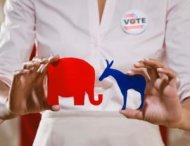 Thinkstock.comA CNN.com story headlined "Do hormones drive women's votes?" sparked a social media backlash that lasted for seven hours Wednesday before the network removed the post late that night.
Thinkstock.comA CNN.com story headlined "Do hormones drive women's votes?" sparked a social media backlash that lasted for seven hours Wednesday before the network removed the post late that night.
The story, posted in the website's medical and health section Wednesday afternoon, began, "There's something that may raise the chances for both presidential candidates that's totally out of their control: women's ovulation cycles."
The story cited a new study to be published in "Psychological Science"?by Kristina Durante, an assistant professor in the department of marketing at the University of Texas San Antonio and the study's main author. Durante's online surveys of several-hundred women led her to conclude that, when they are ovulating, single women espouse more liberal beliefs, while married or committed women gravitate towards more conservative views.
(The same journal published a study in October concluding that the more muscular a man is, the more likely he is to support government policies that serve his self interest, such as low taxes for the rich if he is wealthy.)
CNN said Durante hypothesized that single women "feel sexier" when ovulating and thus "lean more toward liberal attitudes on abortion and marriage equality." Married women, trying to resist their "sexy" feelings, do the opposite.
Durante wrote in an email to Yahoo News that there were some "misunderstandings" of her research in the CNN piece, but did not elaborate.
A barrage of women took to Twitter to mock the premise that women vote with their hormones and wondered why a similar story was not written about the biochemical changes of men and how they affect their votes.
"When I ovulate I'm all 'DEFICIT SPENDING SPURS THE ECONOMY' but when I'm not I want to privatize Social Security," joked one?of the thousands of people to weigh in on the story there.
The author of the CNN post, Elizabeth Landeau, defended the story, writing on Twitter that it was a peer-reviewed study and that she included skepticism from political scientists.?Landeau quoted Paul Kellstedt, for instance, associate professor of political science at Texas A&M University, who said that the study leaves out that men's behavior is also affected by biochemical changes.?Another political scientist, Susan Carroll of Rutgers, was quoted saying the difference between voting preferences of married and single women is better explained by the difference in their economic statuses and other non-hormonal factors.
When CNN took down the post it appended a note that read, "Some elements of the story did not meet the editorial standards of CNN," but did not specify which elements were not up to snuff. A spokesman there hasn't yet responded to Yahoo News's request for comment.
Source: http://news.yahoo.com/blogs/ticket/cnn-takes-down-hormones-drive-women-votes-story-152048023.html
wwe wrestlemania oakland shooting mega millions winning numbers autism speaks ubaldo jimenez ncaa final country music awards
No comments:
Post a Comment